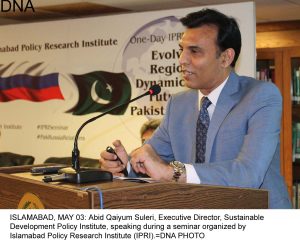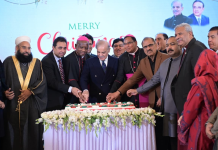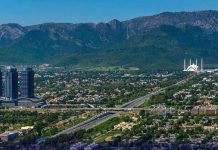ISLAMABAD, MAY 03 (DNA) – The Islamabad Policy Research Institute (IPRI) organized a One-Day Seminar on “Evolving Regional Dynamics and Future of Pakistan-Russia Relations” in Islamabad, on Friday.Giving an overview of Pakistan-Russia’s bilateral relations in his Welcome Address at the one-day seminar on “Evolving Regional Dynamics and Future of Pakistan-Russia Relations”, President of IPRI, Ambassador Vice Admiral (R) Khan Hasham Bin Saddique, outlined that the relationship has carried the baggage of realpolitik when both states pursued their divergent national interests, but “as the Cold war era ended, following a period of somewhat dormancy, both states re-established their relations at a basic level.”
Vice Admiral Saddique stressed that there are common areas of cooperation between Pakistan and Russia such as combating terrorism, bilateral trade, economic cooperation and stability in the region, especially Afghanistan.

“As Asia emerges as a hub of economic corridors, Pakistan offers attractive economic opportunities to the regional countries and beyond. CPEC, a pilot project of Chinese Belt and Road Initiative (BRI) is a case in point. Initiatives like Turkmenistan-Afghanistan-Pakistan-India (TAPI), Central Asian Region Economic Cooperation (CAREC) programme and ideas like South-South cooperation can provide foundational basis for greater regional homogeneity and integration.
Pakistan, being an energy scarce country, Russia has the resources to offer which if taken advantage of, can boost our struggling economy,” he stressed.
He hoped the discussion would answer critical questions, including how Russia will act in a multipolar world; how will India factor, given Indo-Russian strategic partnership, impact Pakistan-Russia relations; what are the prospects of Pakistan-China-Russia relations on trilateral basis; and what could be possible contours of a Pak-Russia strategic framework and roadmap.
Dr Sergei A. Baranov, Counsellor from the Embassy of the Russian Federation, in his Keynote Address, reiterated that Pakistan is first and foremost an important partner for Russia. He shared that the significance of Pakistan is determined by its role in regional politics, its influence in the Muslim world and its geostrategic position.
“Interaction with Pakistan in the framework of the Shanghai Cooperation Organization (SCO), as a full-fledged member, is very important for Russia to carry out cross-regional economic, energy and infrastructure projects, and we are very glad that Pakistan is practically engaged in SCO, especially in joint counterterrorism efforts.” Dr Baranov highlighted how recent years have witnessed steadfast progress in bilateral relations with leaders from both countries meeting regularly to exchange views on key issues of regional and bilateral importance.
“Such meetings give an added impetus to our mutually beneficial partnership”, he remarked. The Counselor also pointed out that the economic dimension of Pak-Russian cooperation has not corresponded to its potential.
“The low level of direct business ties and insufficient knowledge of Russia’s and Pakistan’s business communities about each other’s capabilities remain weak points. In this regard, great expectations are pinned on the Russian-Pakistani Intergovernmental Commission on Trade and Economic, Scientific and Technical Cooperation which has identified priority avenues of our business and investment cooperation.”
The Counselor said Russia was keen to develop strong business-to-business contacts between businessmen of Pakistan and Russia, besides making sincere efforts to explore mutual trade potential.
Following the keynote, Mr Nawaz Khan, Research Officer at IPRI made a presentation on “Pakistan-Russia Economic Relations.”
He was of the view that Russian investment in the energy field will contribute to economic buoyancy; and ultimately pave way for regional integration, specifically through transnational energy cooperation.
However, he warned that the unsettled issue of mutual financial obligations and lack of connection between corresponding banks was impeding economic cooperation between Pakistan and Russia.
In the working session, chaired by Ambassador (R) Aizaz Ahmad Chaudhry, Director General, Institute of Strategic Studies (ISS), Dr Ahmed Ijaz Malik, Assistant Professor, School of Politics and International Relations, Quaid-i-Azam University, highlighted that in view of the global changes post-9/11 and Russia’s rebalancing towards South Asia, Pakistan is likely to benefit from its economic assistance and military technological exchanges.
This cooperation, however, should not be seen as anti-India since Moscow has been systemically and continually supporting Delhi militarily.
This is detrimental to and for Pakistan. Dr Malik further pointed out that in Russia’s greater designs, Iran and India figure more prominently than Islamabad.
“While Pakistan needs to remain cautious about this, there are areas of convergence. For example, Russia supports Pakistan’s accession to the Nuclear Suppliers Group.
Accession of both Pakistan and India to the Shanghai Cooperation Organisation further signifies the importance of Pakistan as one of the pivotal states. Russia and Pakistan also agree on issues of counterterrorism,” he shared.
Providing a bird’s eye view of the scope for economic cooperation in bilateral relations, Dr Abid Qaiyum Suleri, Executive Director, Sustainable Development Policy Institute (SDPI), said that it is important to understand Russia’s geography, especially when it comes to enhancing economic relations with it since it borders 14 other countries.
He said that since becoming part of the World Trade Organization, Russia has consistently worked to improve its trade and commerce environment due to which its Ease of Doing Business ranking is at 35, more than a 100 points better than Pakistan.
“What is also important to note is that while Pakistan has a trade deficit with many countries, including China, with Russia, we have a huge trade surplus.”
Sharing details about the export-import potential between the two, he said that the bulk of Russia’s imports from Pakistan consist of citrus, articles of apparel and surgical goods; while Russia’s exports to Pakistan consist mainly of bituminous coal, helicopters, newsprint, iron roll, and edible vegetables.
Dr Suleri said that it is important to focus on value chain integration with Russia, particularly in surgical instruments; medicines; cotton-based clothing; and fisheries.
“In the agriculture sector, it is important to focus on adapting to Non-Tariff Barriers in citrus; and tapping Russian investment in oil and gas sector besides inviting Russian private sector interest in SEZs”, he concluded.
Ambassador (R) Mohammad Khalid Khattak, Former Ambassador of Pakistan to Russia, was of the view that it is important to look into the history, psyche and mind of Russia and that of the Afghans in order to build a relationship of trust with them.
“Russia is a security state and for them security is more important than economics.” About the issue of peace in Afghanistan, he lamented that Afghanistan faces two major problems- one, its transition from a tribal state into a national state has been very turbulent; and two, it came into existence without any defined borders or frontiers.
He stressed that while an Afghan-led and Afghan-owed peace process is an important construct, outside powers have to do a lot of basic homework and provide a national format and layer it with a regional and international one, if there is to be any eventual peace in the territory.
Ambassador (R) Aizaz Ahmad Chaudhry, Director General, Institute of Strategic Studies (ISS), was of the view that while Pakistan, Iran, China and the Central Asian states have already been playing an instrumental role in the Afghan peace process through several track two initiatives, the Moscow Format talks in November 2018, as well as recent intra-Afghan dialogue in Moscow in February 2019 are very important and historic because they were the first official intra-Afghan talks, stimulating optimism by bringing a different and much needed dimension to the Afghan peace process.
He was optimistic that given how there was now building regional consensus that peace in Afghanistan is vital for the region’s growth and prosperity, the issue would find resolution.
On Pak-Russia ties, Ambassador Chaudhry opined that the relationship is not broad-based and both countries have a long way to go in getting to know and understand each other better.
He predicted that the SCO, in the future, could become an arbiter of regional disputes. He concluded that while India remains a limiting factor because Russia will not want to shift away from its traditional partner, “this is an age in which alliances are issue-based. Russia’s relationship with Pakistan should not be viewed from an India-centric lens.”.=DNA
===================











